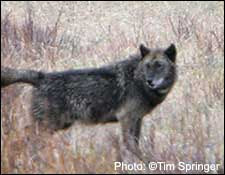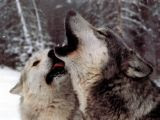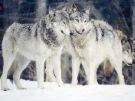Dogs and Wolves - - How Different Are They From Each Other?
For fun today but also to provoke some deep thought, I wanted to post a fable here to help you to consider the relationship between the wild and wonderful wolf and our domesticated canine friend also known as "man's best friend", the dog.
The Dog and the Wolf (Aesop Fable)
A gaunt Wolf was almost dead with hunger when he happened to meet a House-dog who was passing by. "Ah, Cousin," said the Dog. "I knew how it would be; your irregular life will soon be the ruin of you. Why do you not work steadily as I do, and get your food regularly given to you?"
"I would have no objection," said the Wolf, "if I could only get a place."
"I will easily arrange that for you," said the Dog "come with me to my master, and you shall share my work."
So the Wolf and the Dog went towards the town together. On the way there the Wolf noticed that the hair on a certain part of the Dog's neck was very much worn away, so he asked him how that had come about.
"Oh, it is nothing," said the Dog. "That is only the place where the collar is put on at night to keep me chained up; it chafes a bit, but one soon gets used to it."
"Is that all?" said the Wolf. "Then good-bye to you, Master Dog."
Better starve free than be a fat slave.
So, our wolves run free. They live free.
When you think about it, wolves are not so different from our dogs. Our dogs have evolved several generations; therefore, their behaviors have evolved. We can keep them as pets. However, how far apart is the divide between dogs and wolves?
If we keep our dogs outside and do not let them share our homes, they will roam and eventually meet up with other dogs who roam free. If we do not provide a meal to our canine companions, they will hunt for their survival. Dogs who are introduced to these conditions will begin to run free together, hunt together, and eat together. They will create a pack. They will establish hierarchy in their pack. They will begin to lose their socialization with humans and become skiddish and afraid of us. They may even attempt to bite the hand that reaches for them or charge the person who corners them.
Statistics reflect that a dog that isn't properly "socialized" (such as tied out in the yard to a tree or kept behind a fence in the backyard and ignored) is more likely to bite a human due to fear of humans.
In the dog world, we also talk about "prey instinct" or "prey drive". Some dogs are more likely to chase than others are. You know the dog that I speak of. We have all known at least one. When outside, they notice everything around them and give chase if a bird, squirrel, or even a cat is spotted. Is this a trait specific to our dog companions? Certainly not. This is their heritage as descendants of the wolf.
Unfortunately, because we expect dogs to be domesticated, we have higher expectations of them. When an ordinary dog exhibits any of its natural, innate behaviors on a full-time basis, some call them "feral", others call them "stray", and when these dogs are trapped because they are running free in packs, they then beome "shelter dogs". If their "wolf" like behaviors persist, we call them "unadoptable". If we feel sorry for them and take them into our homes and try to keep them there, they become known as "bad dog".
But the canines that we have come to accept as behaving that way and living outdoors for centuries now - but not without its problems - we call the wolf.
So, what is the difference between our dogs and wolves? Not a whole lot with the exception of we take dogs into our homes, care for them, and provide for them. We give them a place in our hearts.
So, why not the wolf? Let's give the wolf a place in our hearts so that we can Save The Wolves Now!




No comments:
Post a Comment